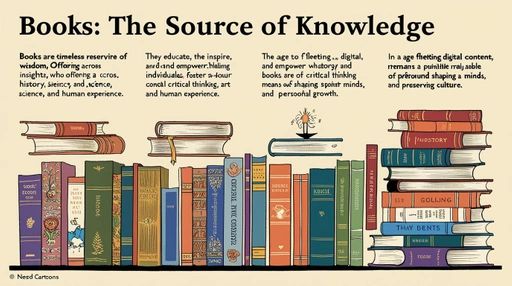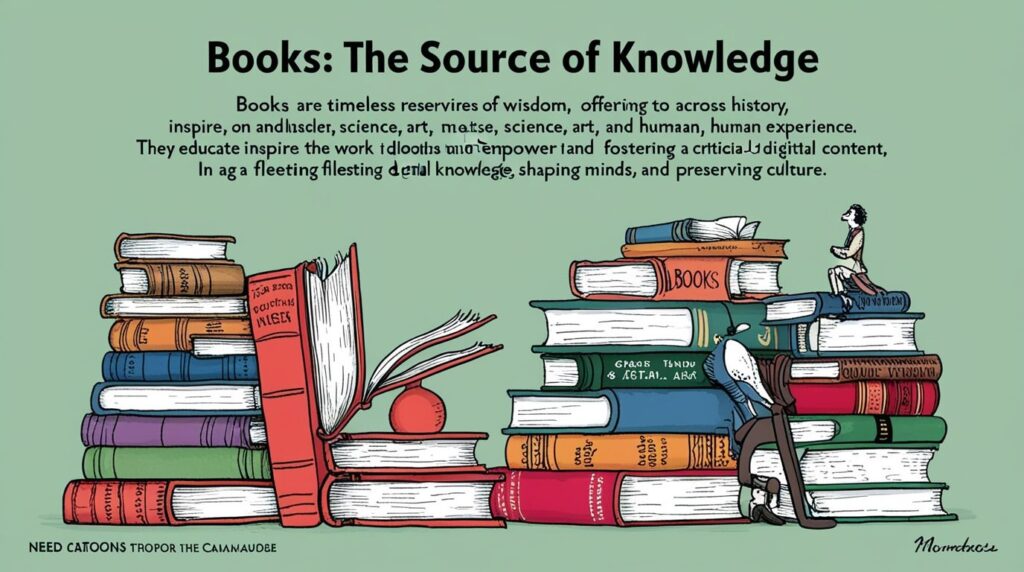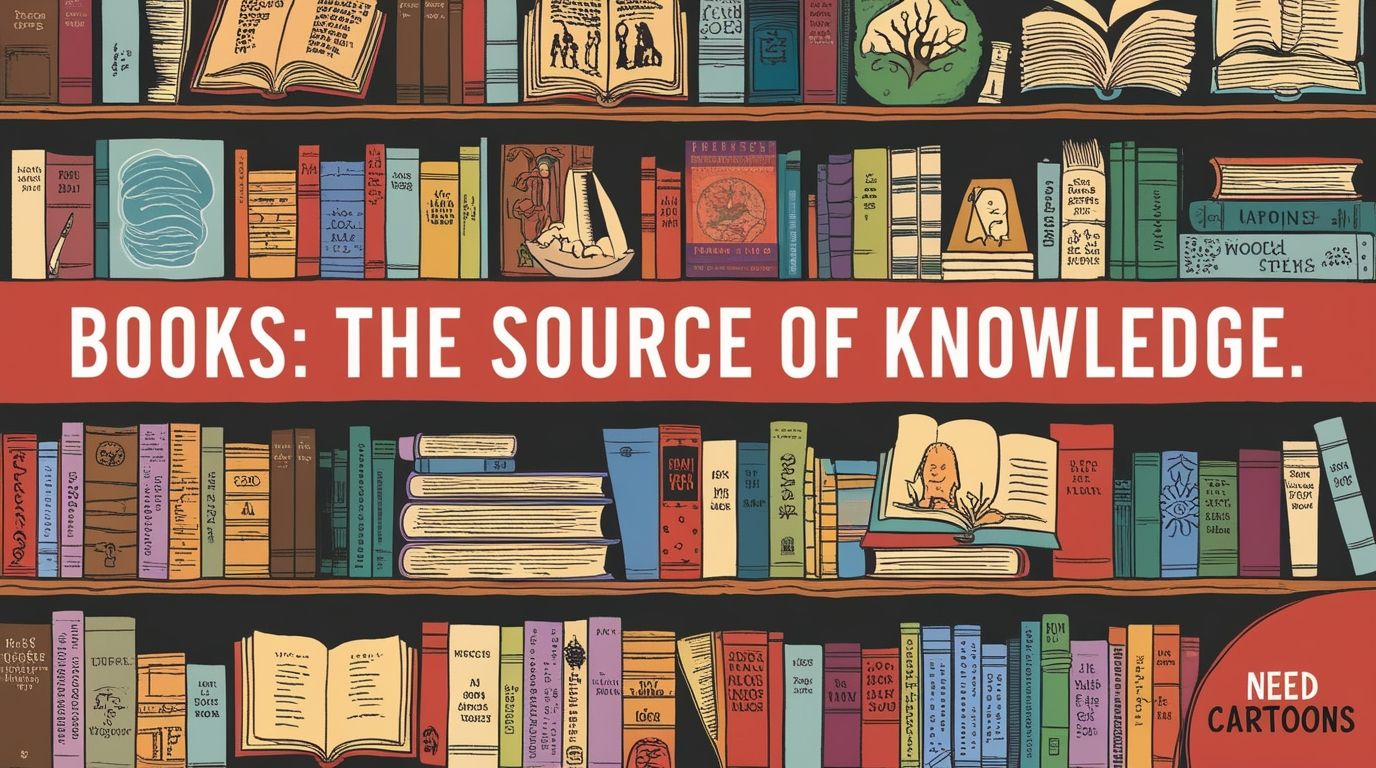Books have always been regarded as one of the most significant tools for acquiring knowledge. They hold the power to educate, inspire, and transform individuals and societies. From ancient scrolls and manuscripts to modern printed editions and e-books, books have stood the test of time, consistently serving as vessels of wisdom and creativity. In the modern era, despite technological advancements and the rise of digital media, books continue to remain a vital source of knowledge, shaping the minds of individuals and fostering intellectual growth.
Historical Significance of Books
The history of books dates back thousands of years, beginning with the invention of writing and the subsequent development of scrolls and codices. In ancient civilizations such as Mesopotamia, Egypt, and Greece, books in the form of clay tablets, papyrus scrolls, and manuscripts were used to record laws, religious texts, and scientific discoveries. The invention of the printing press by Johannes Gutenberg in the 15th century revolutionized the production and distribution of books, making them accessible to a wider audience and sparking an era of intellectual enlightenment.
Books have historically been at the forefront of preserving and disseminating knowledge. They have played a critical role in documenting human achievements, philosophical ideas, and cultural narratives. Libraries, as repositories of books, have served as centers of learning and innovation, attracting scholars and thinkers from across the globe.
Books as Educators
Books are unparalleled educators. They serve as primary resources for formal education, providing structured knowledge across various disciplines, from science and mathematics to literature and history. Textbooks are meticulously crafted to cater to different levels of learning, ensuring that students grasp concepts effectively.
In addition to formal education, books facilitate self-learning. They empower individuals to explore topics of interest, acquire new skills, and expand their horizons. A book on astronomy can transport a reader to the stars, while a book on psychology can offer profound insights into human behavior. The diversity of subjects covered by books ensures that there is something for everyone, irrespective of age, interest, or profession.

Books and Personal Growth
Beyond education, books play a pivotal role in personal development. Self-help books, for instance, provide guidance on improving one’s life, achieving goals, and overcoming challenges. Biographies and autobiographies offer readers a glimpse into the lives of remarkable individuals, inspiring them to pursue their aspirations.
Books also contribute to emotional and psychological well-being. Fiction, with its vivid storytelling and compelling characters, can evoke empathy, improve emotional intelligence, and provide a sense of escapism. Poetry, with its rhythmic beauty and profound meanings, can soothe the soul and stimulate introspection.
Books vs. Modern Media
In an age dominated by the internet and digital media, one might question the relevance of books as a source of knowledge. While modern technologies provide instant access to information, they often lack the depth and reliability that books offer. Books are usually the result of extensive research and careful editing, ensuring their credibility. In contrast, online information can sometimes be fragmented, superficial, or misleading.
Moreover, books encourage deep reading and critical thinking. Unlike digital content, which is often consumed rapidly and passively, books demand focus and engagement. The act of reading a book fosters concentration, analytical skills, and the ability to synthesize information.
The Universality of Books
Books transcend cultural and linguistic barriers, making knowledge accessible to diverse populations. Translations of classics, scientific works, and literary masterpieces have enriched global understanding and fostered cross-cultural exchange. For instance, the translation of Greek philosophical texts into Arabic during the Islamic Golden Age paved the way for significant advancements in science and philosophy.
Books are also accessible to people across different socioeconomic backgrounds. Public libraries and community initiatives often provide free or affordable access to books, ensuring that knowledge is not confined to the privileged few. In many developing countries, books are instrumental in promoting literacy and education, empowering individuals to improve their lives.
The Evolution of Books
The advent of digital technology has transformed the way books are produced, distributed, and consumed. E-books and audiobooks have made reading more convenient, allowing people to access books on their devices anytime and anywhere. Online platforms and digital libraries have expanded the reach of books, enabling readers to explore vast collections without the constraints of physical space.
Despite these advancements, traditional printed books continue to hold their charm. The tactile experience of flipping through pages, the scent of paper, and the visual appeal of well-designed covers contribute to the enduring popularity of physical books. Many readers still prefer the immersive experience that a printed book offers, highlighting the coexistence of tradition and innovation in the world of books.

Challenges and the Future of Books
While books remain a vital source of knowledge, they face several challenges in the modern era. The decline in reading habits, driven by the prevalence of digital distractions, poses a significant threat to the culture of reading. Efforts to promote reading, such as book fairs, literary festivals, and reading campaigns, are crucial in addressing this issue.
The publishing industry also faces challenges related to sustainability. The production of physical books requires substantial resources, raising concerns about environmental impact. Publishers are increasingly adopting eco-friendly practices, such as using recycled paper and digital printing technologies, to minimize their carbon footprint.
The future of books lies in their ability to adapt to changing times while preserving their essence as repositories of knowledge and creativity. Hybrid formats that combine the advantages of digital and print media, along with innovative content delivery methods, are likely to shape the evolution of books in the coming years.
Conclusion
Books are timeless treasures that embody the collective wisdom, imagination, and experiences of humanity. They have been instrumental in shaping civilizations, educating generations, and inspiring countless individuals. In a world where information is abundant but often transient, books stand as reliable and enduring sources of knowledge.
Whether in the form of ancient manuscripts or modern e-books, books continue to enlighten, entertain, and empower. Their role in fostering intellectual growth, personal development, and cultural exchange underscores their irreplaceable value. By nurturing a love for books and promoting reading as a lifelong habit, we can ensure that these invaluable sources of knowledge continue to enrich lives and build a brighter future for generations to come.

6 thoughts on “Books: The Source of Knowledge”
Comments are closed.